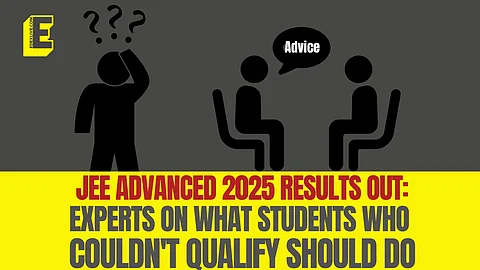

The Indian Institute of Technology (IIT) Kanpur announced the results of JEE Advanced 2025 today, Monday, June 2. The exam was held on Sunday, May 18, across two shifts.
Of the 1,80,442 students who appeared for both sessions, only 54,378 qualified, leaving a large number of aspirants disappointed.
To understand the way forward for students who didn’t qualify, EdexLive spoke to Joint Entrance Exam (JEE) experts for advice and guidance.
Why don't many clear JEE Advanced
According to Purnima Lodha Kaul, mentor and founder of JEE One coaching academy, "The reason many students don’t clear JEE Advanced is two-fold. Firstly, the number of students who qualified are very limited, making the selection process extremely competitive. Secondly, the exam's difficulty level is significantly higher than JEE Main — it demands a deeper understanding of concepts."
Agreeing to this sentiment, JEE Coach MN Rao added, “JEE Advanced follows a completely different pattern from JEE Main. It requires in-depth conceptual clarity and rigorous preparation.”
Exploring alternatives: Counselling and other universities
Both experts strongly urge students to participate in the counselling process, which begins on Tuesday, June 3. Students may still gain admission to top engineering colleges, such as National Institutes of Technology (NITs) and Indian Institutes of Information Technology (IIITs), through their JEE Main ranks.
Purnima also recommends considering other reputed private institutions such as:
BITS Pilani (Goa, Hyderabad, Dubai campuses)
VIT University
Manipal University
SRM University
Additionally, Rao suggests applying to state-level universities as viable alternatives.
Should you take a drop year?
When asked about taking a drop year to reattempt the exam, Rao advised, “Take a drop year only if you're genuinely confident in your ability to improve and clear the exam next year — not because of pressure from parents or teachers.”
Purnima added, “If a student has just finished Class 12 and didn’t get through, taking a drop is acceptable since they can now study more intensively without school-related distractions. However, I strongly discourage taking a second drop year. With the ongoing irregularities by the National Testing Agency (NTA), it’s not wise to waste another year.”
How does one prepare during a drop year?
For those considering a drop year, both experts stress the importance of:
Identifying weak areas and addressing them in the first four months.
Revising class notes thoroughly rather than assuming familiarity with topics.
Solving daily practice problems, modules from coaching institutions, and previous years’ question papers.
Attempting regular mock tests and institutional exams to build time management and exam temperament.
Other career and educational pathways
Students are also encouraged to explore broader career interests and strengthen their profiles while pursuing engineering to stay relevant in the face of ongoing trends.
Purnima suggests learning coding, artificial intelligence (AI), machine learning (ML), or cybersecurity, as they are the key sectors of development for the next four to five years. She recommends pursuing online certification courses aligned with current industry trends.
Meanwhile, Rao advises students who are unsure about engineering to consider preparing for the Civil Services examinations.
Additionally, he recommended institutions like:
RV College of Engineering, Bengaluru
Institute of Chemical Technology, Mumbai
Ramaiah Institute of Technology, Bengaluru
Making the most of college life
Purnima emphasises that students should aim for good academics (a decent Cumulative Grade Point Average - CGPA) and also get involved in co-curricular activities to build communication skills that can enhance their resumes.
Final advice
The experts remind students that not clearing JEE Advanced is not the end of the road. Purnima concludes, “The exam is designed to select only around 10% of the candidates. It's not the student’s fault. Students need to stay resilient and explore the many opportunities still available.”
With counselling yet to begin and numerous alternative paths open, students have ample opportunities to carve out a successful future.
